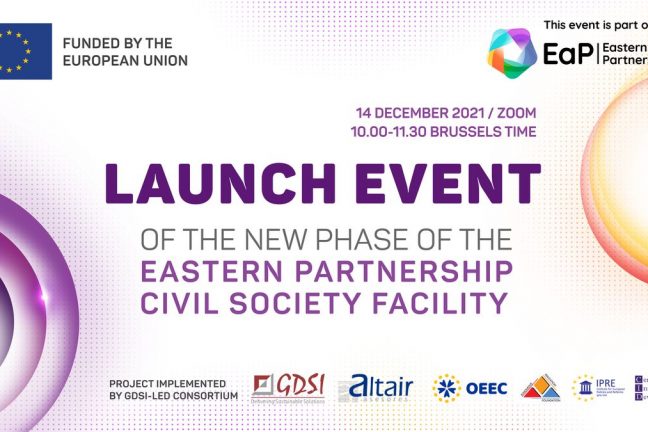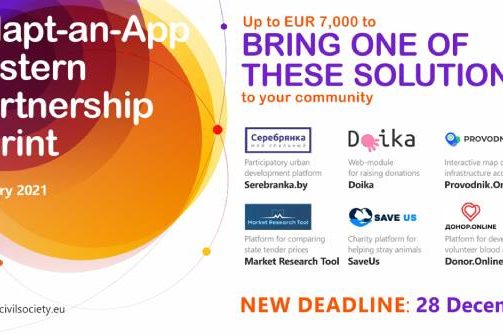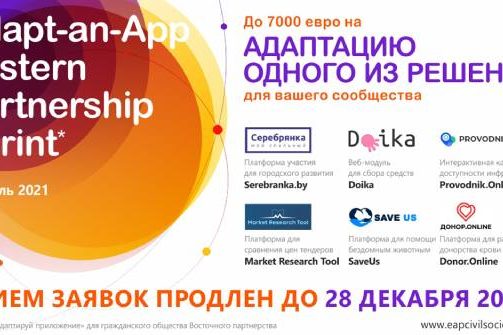1. Background
The proposed studies are to be implemented as part of the EU funded project “EaP Civil Society Facility”, what started in December 2016 and will run until December 2020. The Project is implemented by the consortium of GDSI Limited (Ireland), Altair Asesores S.L. (Spain), CCC Creative Center (Ukraine), International Center for Human Development (Armenia), Office for European Expertise and Communications (Belarus) and Transparency International Georgia.
The project’s main objective is to strengthen and promote civil society’s role in reforms and democratic changes taking place in the Eastern Neighbourhood countries, through increased participation in the fulfilment of Neighbourhood Policy objectives.
The mail purpose of this project is to set-up a regional integrator and capitalisation centre, creating synergies between the various bilateral and regional initiatives for civil society and contributing to the replication and sustainability of their results.
The project is collecting and developing initiatives for capitalisation on the previous experience of EU projects/ grants along the following main results areas:
- mapping studies,
- e-learning for and training of CSOs,
- hackathons on IT applications for CSO’s better involvement in holding governments to account,
- administering Civil Society Fellowships, and
- promoting the role of CSOs in the democratic changes in their countries.
The European Union (hereafter EU) considers civil society organisations (hereafter CSOs) not only as service providers and implementers of EU-funded actions, but also as key political actors in human development and democratization processes. A strong civil society involved in social, economic and political dialogues and capable of engaging in policy strategy is desirable to make development more effective and promote and/or strengthen democratization processes.
The 2012 Communication “The roots of democracy and sustainable development: Europe’s engagement with Civil Society in external relations” constitutes the most comprehensive policy document outlining the EU approach, principles and priorities with regards to the EU engagement with CSOs. The Communication, which further develops the dispositions of the Agenda for Change, and echoes the rise of CSOs in international development debates, puts forward three priorities for EU support:
- To enhance efforts to promote a conducive environment for CSOs in partner countries;
- To promote a meaningful and structured participation of CSOs in domestic policies of partner countries, in the EU programming cycle and in international processes and;
- To increase local CSOs’ capacity to perform their roles as independent development actors more effectively. In spite of its eminently country focus, the Communication also addresses the regional and global dimensions of EU engagement with CSOs.
The New Consensus of development, issued in 2017, echoes this commitment and further develops the EU commitment to the 2030 Agenda (where multi-stakeholder approaches are key) as well as to right based approaches
2. Aims of the Study
The studies are planned to enable the EU to plan and implement effective and efficient measures for the implementation of the stated priorities. Specifically, the studies aim to identify and analyse the civil society sector in the EaP countries, including the division between active and dormant organisations, urban and rural, types of CSOs, their areas of work, people engaged in their work and communities they serve, etc. and presenting a clear statistical analysis of the sector for the purposes of designing the future initiatives of the EC.
In line with the project’s ToR, these mappings will not include an analysis of the environment in which civil society organisations operate, as this will be covered by another project which will develop a monitoring tool for CSO development in the region.
3. Methodology and Implementation
The approach to the Mapping studies in EaP countries is to engage research and data collection organisations capable of undertaking the data collection and analysis of CSOs in 6 EaP Countries, using a common methodology to allow for the regional comparison. The study of Moldova is the first location for this research and will act as a pilot.
This mapping study is characterised by the significant empirical work. The empirical part of the mapping is based on the following materials:
- Government official databases of registered CSOs
- Lists of CSOs provided by Consortium members in the EaP countries
- Information from the National Platform and from the Secretariat of the EaP Civil Society Forum.
The approach includes the analysis of the existing database, identification of the sample, stratification of the sample, development of the questionnaire, collection of data, analysis and the presentation of data in a short 10 page narrative report, excluding the database and charts.
The specific topics of the research shall include:
- Number of civil society organisations
- Information on active vs dormant
- Information on rural vs urban, national vs regional or local
- Types of organisations,
- Number of people engaged in them/ gender profile of staff
- Areas of work of CSOs
- Information on CSOs’ constituencies and target groups
- Information on the use of ICT tools by CSOs in every day work, in interaction with government and or constituents, promotion, etc.
The Team Leader of the project will have a direct supervisory role for the research.
In order to meet the requirements for the studies, and to achieve concise and useful reports a disciplined approach is required that draws on best practice in the design and conduct of policy-relevant research.
4. Output of the Study
The report following this work should be delivered in English, which will then be translated into the regional languages. Each country report shall not exceed 10 pages (plus annexes), and shall start with a meaningful executive summary of maximum 3 pages summarising the main findings.
The reports will be presented to the DG NEAR and the relevant EU Delegation, who will make a decision on the intended audience of the report. The copyright of the report will belong to the DG NEAR and it will remain confidential.
The content of the reports shall be as follows:
- Executive summary – 3 pp.
- Presentation of study, summary of methodological approach (accompanied by details in annexes as appropriate) – 1-1.5 pp.
- Main findings and conclusions (divided into sections as appropriate, per topic to be covered) – 8-9 pp.
- General conclusions – 0.5-1 pp.
- Annexes
5. Assumptions and risks of the study
The following challenges, risks and limitations are associated with this study:
- The method is reliant on the capacity of the Implementing Organisation to utilise a sound sampling methodology
- The research is reliant on the interest of CSOs in engaging with the researchers
6. The schedule of work*
| Task/ Weeks | 1 | 2 | 3 | 4 | 5 | 6 | Output |
| 1. Research work | Lists, questionnaire, report | ||||||
| 2. Production of the report | Report | ||||||
| 3. Presentation of the findings | Presentation |
* Tentative schedule of work
7. Expressing Interest
Interested organisations are invited to apply to express their interest by writing to: [email protected] with the following information:
- Proposed sampling and stratification methodology
- Proof of previous similar work/ Presentation of organisation’s experience
- Itemised Budget.
Successful applicants will be invited for contract negotiation.
Interested parties can request clarifications on this assignment by writing to the above address up to Friday, January 26, 12:00 CET.
8. Deadline
The deadline for applications is January 29, 2018 at 12:00 CET by e-mail at [email protected]




Comment